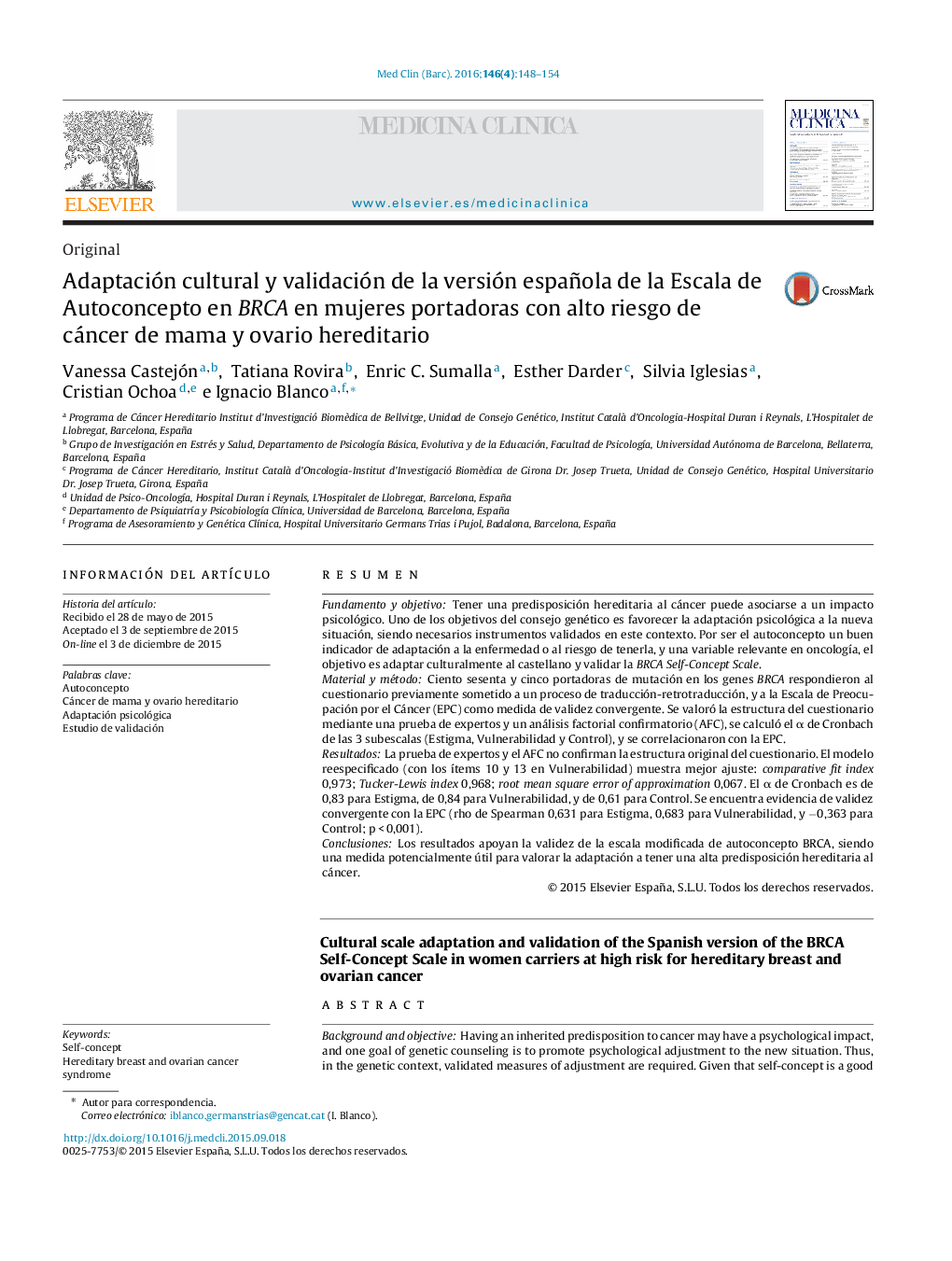| کد مقاله | کد نشریه | سال انتشار | مقاله انگلیسی | نسخه تمام متن |
|---|---|---|---|---|
| 3798280 | 1244430 | 2016 | 7 صفحه PDF | دانلود رایگان |

ResumenFundamento y objetivoTener una predisposición hereditaria al cáncer puede asociarse a un impacto psicológico. Uno de los objetivos del consejo genético es favorecer la adaptación psicológica a la nueva situación, siendo necesarios instrumentos validados en este contexto. Por ser el autoconcepto un buen indicador de adaptación a la enfermedad o al riesgo de tenerla, y una variable relevante en oncología, el objetivo es adaptar culturalmente al castellano y validar la BRCA Self-Concept Scale.Material y métodoCiento sesenta y cinco portadoras de mutación en los genes BRCA respondieron al cuestionario previamente sometido a un proceso de traducción-retrotraducción, y a la Escala de Preocupación por el Cáncer (EPC) como medida de validez convergente. Se valoró la estructura del cuestionario mediante una prueba de expertos y un análisis factorial confirmatorio (AFC), se calculó el α de Cronbach de las 3 subescalas (Estigma, Vulnerabilidad y Control), y se correlacionaron con la EPC.ResultadosLa prueba de expertos y el AFC no confirman la estructura original del cuestionario. El modelo reespecificado (con los ítems 10 y 13 en Vulnerabilidad) muestra mejor ajuste: comparative fit index 0,973; Tucker-Lewis index 0,968; root mean square error of approximation 0,067. El α de Cronbach es de 0,83 para Estigma, de 0,84 para Vulnerabilidad, y de 0,61 para Control. Se encuentra evidencia de validez convergente con la EPC (rho de Spearman 0,631 para Estigma, 0,683 para Vulnerabilidad, y −0,363 para Control; p < 0,001).ConclusionesLos resultados apoyan la validez de la escala modificada de autoconcepto BRCA, siendo una medida potencialmente útil para valorar la adaptación a tener una alta predisposición hereditaria al cáncer.
Background and objectiveHaving an inherited predisposition to cancer may have a psychological impact, and one goal of genetic counseling is to promote psychological adjustment to the new situation. Thus, in the genetic context, validated measures of adjustment are required. Given that self-concept is a good indicator of adjustment to the disease or to the risk for it, and a relevant variable in oncology, the goal of the study is to culturally adapt and validate the BRCA Self-Concept Scale.Material and MethodOne hundred and sixty-five BRCA carriers’ women answered to the questionnaire, previously adapted through a process of forward/back-translation, and to the Cancer Worry Scale (CWS) as a measure of convergent validity. Theoretical structure of BRCA Self-Concept Scale was assessed by expert judges, and submitted to a confirmatory factor analysis (CFA). Cronbach's α was calculated for each subscale (Stigma, Vulnerability and Control), and correlations with CWS were performed.ResultsExpert judges’ structure and CFA do not support the original structure of the questionnaire. The respecificity model (with items 10 and 13 loading on Vulnerability factor) show a better fit: comparative fit index 0.973; Tucker-Lewis index 0.968; root mean square error of approximation 0.067. The Cronbach's α is 0.83 for Stigma, 0.84 for Vulnerability, and 0.61 for Control. Evidence of convergent validity with CWS has been obtained (Spearman's rho 0.631 for Stigma, 0.683 for Vulnerability, and −0.363 for Control; P < .001).ConclusionsResults support the validity of the modified Spanish BRCA Self-Concept Scale, which is a potentially useful measure for the study of psychological adjustment to high risk for hereditary breast and ovarian cancer.
Journal: Medicina Clínica - Volume 146, Issue 4, 19 February 2016, Pages 148–154